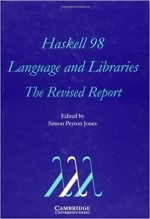Haskell 98 Language and Libraries. The Revised Report

Категория: Other
Поделиться:
The committee intended that Haskell would serve as a basis for future research in language design, and hoped that extensions or variants of the language would appear, incorporating experimental features.
Haskell has indeed evolved continuously since its original publication. By the middle of 1997, there had been four iterations of the language design (the latest at that point being Haskell 1.4). At the 1997 Haskell Workshop in Amsterdam, it was decided that a stable variant of Haskell was needed; this stable language is the subject of this Report, and is called "Haskell 98".
Haskell 98 was conceived as a relatively minor tidy-up of Haskell 1.4, making some simplifications, and removing some pitfalls for the unwary. It is intended to be a "stable" language in sense the implementors are committed to supporting Haskell 98 exactly as specified, for the foreseeable future.
The original Haskell Report covered only the language, together with a standard library called the Prelude. By the time Haskell 98 was stabilised, it had become clear that many programs need access to a larger set of library functions (notably concerning input/output and simple interaction with the operating system). If these program were to be portable, a set of libraries would have to be standardised too. A separate effort was therefore begun by a distinct (but overlapping) committee to fix the Haskell 98 Libraries.
Скачать
Комментарии